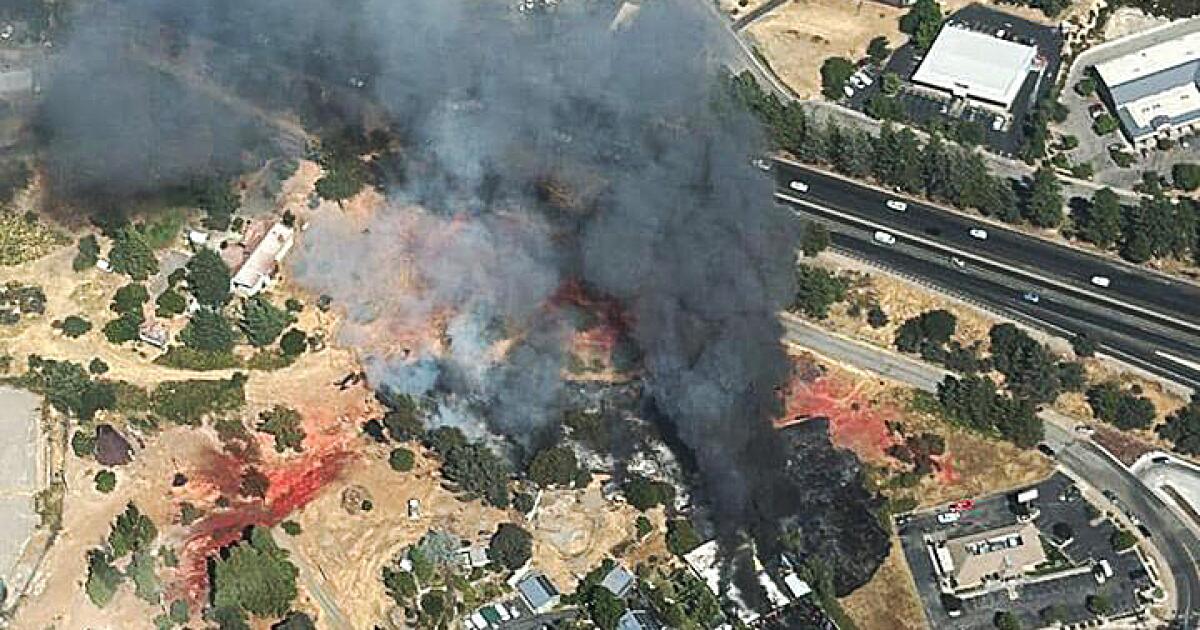With television cameras rolling and traffic humming in the background on a busy San Fernando Valley freeway, Gov. Gavin Newsom threatened Thursday to pull state funding from counties that fail to show improvements in homelessness.
“If we don't see demonstrable results, I'll start redirecting money,” Newsom said.
“We truly believe that we need local governments to step up. We are in a crisis. We need to act accordingly.”
The Democratic governor’s unbridled frustration over the lack of progress on his top problem — homelessness — is not new, nor is the warning about potentially defunding holdout counties. As he nears the halfway point of his second and final term in office, Newsom is using his platform as governor to ramp up public pressure and blame local leaders for California’s most glaring humanitarian crisis.
Los Angeles County, in particular, has become a frequent target of Newsom’s ire. The governor again criticized the county on Thursday for delaying implementation of a law that expands the criteria for detaining people against their will.
His trip to Pacoima came after his call to eliminate homeless encampments also appeared to fall on deaf ears last month in Los Angeles, where elected officials either criticized the order or said it changed nothing in their policy approach. The governor’s executive order requires his administration to eliminate encampments on state property and urged cities and counties to do the same.
Mayor Karen Bass said “strategies that simply move people from one neighborhood to another or give fines instead of housing don’t work.” Los Angeles County Supervisor Lindsay Horvath said the county is already implementing an “urgent and humane resolution to the encampments.”
Two weeks later, Newsom arrived in a T-shirt, aviator sunglasses and a baseball cap with a crew from the California Department of Transportation to clear out encampments near an entrance to the 5 Freeway in Pacoima. The governor said he signed the executive order with “intent.”
“People can choose not to do anything different,” Newsom said Thursday. “That’s a choice that can be made. This is what I decide … If that’s the outcome, I’m going to redirect the money. It’s not complicated and I’m going to send it to the people who really want to do the work.”
The governor and experts agree that the homelessness crisis has been brewing for decades, but opinions differ on whether Newsom’s more conservative political strategy and mutual finger-pointing will help solve the problem. A shortage of affordable housing, low wages and high cost of living are at the root of a problem that has been exacerbated by mental health issues and drug abuse.
The Newsom administration has spent more than $24 billion clearing encampments, getting Californians off the streets and sidewalks and converting hotels and motels into temporary shelters, among dozens of other initiatives to combat homelessness. The state has increased spending flexibility for local governments and given cities and counties more authority to force Californians into treatment under programs like CARE Court and expanded guardianships.
Proposition 1, Newsom’s ballot measure that voters narrowly approved in March, is expected to provide more than $6 billion for 10,000 treatment and housing beds and expanded drug addiction care.
But Newsom’s policy on encampments and forced care have become points of contention between the governor and homeless advocates, aligning him more with conservatives than progressives in his own party. The governor maintains he has done his job and given cities and counties more funding, tools and authority to address the problem as they requested.
“There are no more excuses,” Newsom said. “They have the money, the flexibility, the green light, the support of the state and the public is demanding it, and if this is not the most important issue, they are not paying attention. This is the biggest scar on the reputation of the state of California.”
In June, Newsom praised a U.S. Supreme Court ruling that allowed Grants Pass, Oregon, to enforce a law banning camping in public places even though the city did not have enough shelter to offer people living in encampments.
Scholars and homeless advocates viewed Newsom’s encampment order, which followed the ruling, as a reaction to political pressure that could worsen the problem rather than offering a solution to help California’s most vulnerable residents.
“People can’t just go away,” said Margot Kushel, a professor of medicine and director of the Benioff Initiative on Housing and Homelessness at the University of California, San Francisco. “There’s no easy way out of this. I have deep compassion for everyone’s frustration. I’m frustrated. I want this problem to end. I understand that this is unacceptable, but I think when you’re in a hole, you need to stop digging.”
Kushel and others described California’s fundamental problem as a shortage of affordable housing. The Newsom administration has spent a lot of funding on the homeless problem, Kushel said, but the state still isn’t building enough housing as the need continues to grow.
A state audit also found that California has failed to monitor the effectiveness of its costly homeless programs, raising questions about whether Newsom’s efforts are worthwhile at a time when the state is facing a budget shortfall. The governor has pushed for more accountability for how local governments use state money.
The state budget passed in July expands the responsibilities of a state Housing Accountability Unit to include oversight of state homeless grants to cities and counties and adds more staff positions for that task. A separate bill, Assembly Bill 3093, seeks to require local governments to plan for housing construction for all income levels, including homeless populations.
San Jose Mayor Matt Mahan applauded Newsom for focusing on improving accountability.
Mahan said developing more affordable housing is vitally important, but addressing the problem immediately takes too long and costs too much. San Jose has focused on using state and federal funds to offer interim and transitional housing communities that provide “a ladder off the streets.”
Last month, Newsom informed San Diego County of the state’s intention to claw back a $10 million grant to build 150 small units for lack of action and redirect the funds to San Jose.
Mahan said he supports the idea of a statewide framework with set goals and specific targets for local governments to build shelter and treatment for their homeless residents.
“I think it will get us out of the fantasy of thinking that we can prioritize solutions that will work if we happen to have another $100 billion,” Mahan said.












